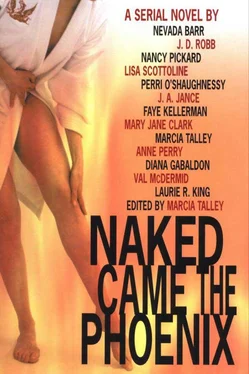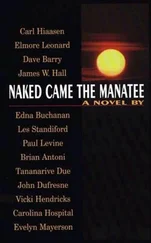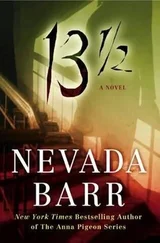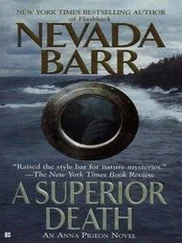"No need," Hilda replied. "It's nothing but a delaying tactic. I didn't kill Claudia de Vries, although, truth be known, I sure as hell wanted to. No, my turning myself in will give you time enough to get rid of the envelope. Then, when they find the real killer, they'll let me go and everything will be fine, and you'll have what you need to get yourself a great settlement. Judges don't just hand those out for no reason, you know," she added. "You have to have the goods on an erring husband in order to do that, especially when the erring husband is a member of Congress. But not to worry. You do have the goods, so take good care of them, while I freshen up and put on some makeup. If I'm going to be arrested, I'm going to be photographed. It wouldn't do for the new owner of Phoenix Spa to be hauled off to jail looking like something the cat dragged in, now would it."
With that Hilda went straight to her closet and paused there, studying the contents. "Which do you think, the navy suit or the fawn?"
"Navy would be better," Caroline supplied.
"Good," Hilda agreed. "That's what I think, too. It does a better job of showing off my hair."
Taking the blue suit with her, Hilda disappeared into the bathroom. Caroline stooped over and picked up the envelope that still lay on the floor where she had dropped it. It was addressed to Mrs. Hamlin Finch, and the postmark was dated weeks ago. From the weight of the envelope, Caroline could tell that it contained many sheets of paper. If each of them meant a separate report, then the surveillance had been going on for some time. So had Douglas 's betrayal and infidelity.
Caroline was still standing and staring at the envelope when the bathroom door opened once more. "Are you still here?" Hilda demanded. "You've got to do something with that, and you've got to do it now. Otherwise, it's going to be too late."
Nodding wordlessly, Caroline retreated upstairs to her loft. Not only had her mother bought back her cello, she had bought back the case as well. The case had a secret compartment concealed in the lid that had been known only to Caroline, her mother, and the person who had made the case. She pressed the pressure point just to the left of the topmost latch, and the satin lining sprang away from the leather to reveal a letter-sized, fold-out pouch. She slipped the envelope into the pouch and then closed up the lining.
Once the damning envelope was out of sight, the weight of all that had happened washed across Caroline and brought her to her knees. It was too much. The pain of her husband's betrayal, the shock of Claudia's death, the prospect of her mother being arrested-it was all more than Caroline could handle. She leaned against the bed with her head buried in the silky cover of her feather-soft duvet while a wild storm of weeping shook her very being. She stayed that way for a long time.
"Caroline?" her mother called up the stairs at last. "Are you still here?"
She stifled a ragged sob. "I'm here," she answered.
"I'm going, then," Hilda said. "I just wanted you to know."
"All right," Caroline managed. "Do you want me to come with you?"
"No. I'm sure you're in no condition to deal with any more stress. You stay here and try not to worry. Everything will be fine."
Everything won't be fine, Caroline wanted to shout at the top of her lungs. My marriage is over. My life is a wreck. My mother is being arrested for murder. But she didn't say any of those things aloud. Instead, she reached out her hand and touched the long, clean neck of the cello. She let her fingers trail along the smooth surface, allowing her fingers to find comfort there. When the door slammed shut behind Hilda Finch, her daughter reached over and removed her bow from its holder. Then she wrested the cello upright and carried it over to the dressing table chair.
Ignoring the ravaged countenance that stared back at her from the mirror, she planted the instrument between her sweats-clad legs and pulled the bow across the strings. The cello was so far out of tune that the shrill sound made her wince. It took her several minutes of tuning before she had it right, but when she did, she launched into the haunting strains of Camille Saint-Saëns's Cello Concerto no. 1. As the music washed over her it brought her the same relief it always had. It was through the cello that she had been able to endure all those years of arguments between her parents. It was music that had seen her through the loneliness of being an only child in an apparently loveless marriage. She had assumed, mistakenly, that once she fell in love-once she found the perfect mate-the peace granted her by music would no longer be necessary.
Wrong, she told herself grimly. Absolutely wrong.
And then, keeping her mind firmly turned away from Nero and his fiddle and the fire consuming Rome, she sat there and played her heart out, waiting for someone to come and tell her that her mother was under arrest.
Even without the benefit of practice and despite having been away from her music for months, Caroline Blessing played better than she ever had before. She played flawlessly because she meant to and because she was playing for her mother. Because somehow, Hilda Finch had known that her daughter would need that cello again. In spite of whatever difficulties had presented themselves, she had gone out and found it.
"Thanks, Mom," Caroline murmured as the last strains of the concerto died away. And then the tears came again.
Phyllis Talmadge entered the interview room, followed closely by her lawyer, Marsha Rollins. Wearing spike heels that clicked ominously on the marble floor, Rollins marched into the room with her laptop in hand and with a three-inch-deep chip on her shoulder.
"I want to object to the fact that you interviewed my client earlier under entirely false pretenses," Marsha Rollins announced. "I'm serving notice right now that anything my client said in the course of that interview will be considered inadmissible."
"Wait a minute, Ms. Rollins," Vince said calmly. "To begin with, your client came to me. I didn't send for her. She came in and spoke to me entirely of her own accord."
"She thought you were a producer," Rollins objected while Phyllis Talmadge nodded furiously. "She thought you were there to interview her…"
Vince smiled. "I was interviewing her," he said.
"… for an appearance on The Today Show ," Rollins finished. "She thought this was something that had been set up by her publicist."
Vince looked past the attorney. "Why are you here, Ms. Talmadge?"
She blinked. "Because you said I had to be. Like everybody else."
"No, I don't mean why are you here in this room. Why are you at Phoenix Spa?"
Phyllis shrugged. "For the same reason everybody else is, I suppose. I have a cover shoot in a few weeks, and I want to look my best. So I thought I'd come here and shed a few pounds. Get in touch with my core being, you know. That kind of thing. In my line of work, centering is very important. Otherwise I can't tune in to the universe and learn what I need to know."
"What is the universe telling you about Claudia de Vries?"
"Really, Detective Toscana, you can't expect my client to answer…"
But Vince had hit Phyllis Talmadge where she lived, in her ability to see deep into other people's hidden lives. "Shut up, Marsha," Phyllis told her attorney. "I want to answer this question. It's important. Claudia de Vries was an evil woman. She preyed on other people her whole life. It's hardly surprising that she finally got what she deserved. In fact, what I can't figure out is why it took someone so long to come after her."
"Did she ever prey on you?" Vince asked.
"Phyllis, please," the attorney objected. "You don't have to say anything."
"She tried to," Phyllis Talmadge said, as her eyes narrowed dangerously. "But I didn't let her get away with it. I told her to back off, and she did."
Читать дальше












